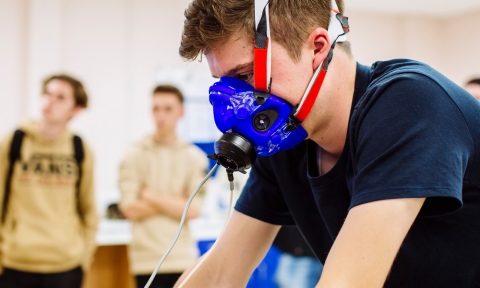
The University of Portsmouth features in the first report measuring the contribution Sport and Exercise Science (SES) makes to the UK.
The ‘Sport and Exercise Education: Impact on the UK Economy’ report, produced by The Physiological Society and GuildHE in partnerhip with Emsi, is an independent assessment of the benefits of SES courses and research to local and national economies, focusing on the contributions of students, universities, and colleges working in the field.
The results show that SES courses added £3.9 billion to the UK economy, with average salaries for SES graduates at £21,100 per annum after six months of employment.
The report also examines the social value of SES courses. Graduates and postgraduate researchers demonstrate high quality transferable skills including critical thinking, attention to detail, interdisciplinary working and, in all four nations of the UK, are using these skills during and after their courses to benefit their local communities and the UK as a whole. Case studies within the report also highlight the contribution of SES courses in promoting women in sport, working with people from disadvantaged backgrounds and the contribution SES research is making to address the major health-related problems in society such as cancer, obesity and diabetes.
Exercise science is addressing some of the major health-related issues plaguing contemporary society, with exercise now being recognised as a non-drug-related intervention in the prevention and treatment of obesity, diabetes, cancer and poor mental health.
Professor Mike Tipton, MBE
At the University of Portsmouth, our Department of Sport and Exercise Science run a wide programme of undergraduate and postgraduate courses and research activities.
The report showcases the University’s research in cold water immersion physiology, which is the foundation of the search, rescue, and treatment of people in the water by a large number of organisations worldwide. For example, research led by Professor Mike Tipton MBE, Dr Heather Massey, Dr Clare Eglin, and Dr Martin Barwood (now Leeds Trinity University) has played a key role in the development of new approaches to drowning prevention and water safety education. Drowning is a significant risk for elite athletes and a leading cause of accidental death in the UK, particularly in young people, causing approximately 400 deaths per year.
Aside from the human cost, drowning and related incidents cost over £63 million per year, costs that can be prevented by safety measures and education. To that end, Portsmouth’s research has underpinned the Royal National Lifeboat Institution’s “Respect the Water” National Water Safety Campaign, informing its “know about Cold Shock” and “Float First” approach to cold-water survival.
This campaign has been cited by a number of drowning-incident survivors as the reason they survived an immersion.
Professor Mike Tipton MBE said: “People are beginning to appreciate that SES isn’t just about running faster; whilst it undoubtedly contributes to improved sporting performance, it also involves improving things like people’s working conditions. Exercise science is addressing some of the major health-related issues plaguing contemporary society, with exercise now being recognised as a non-drug-related intervention in the prevention and treatment of obesity, diabetes, cancer and poor mental health.”
